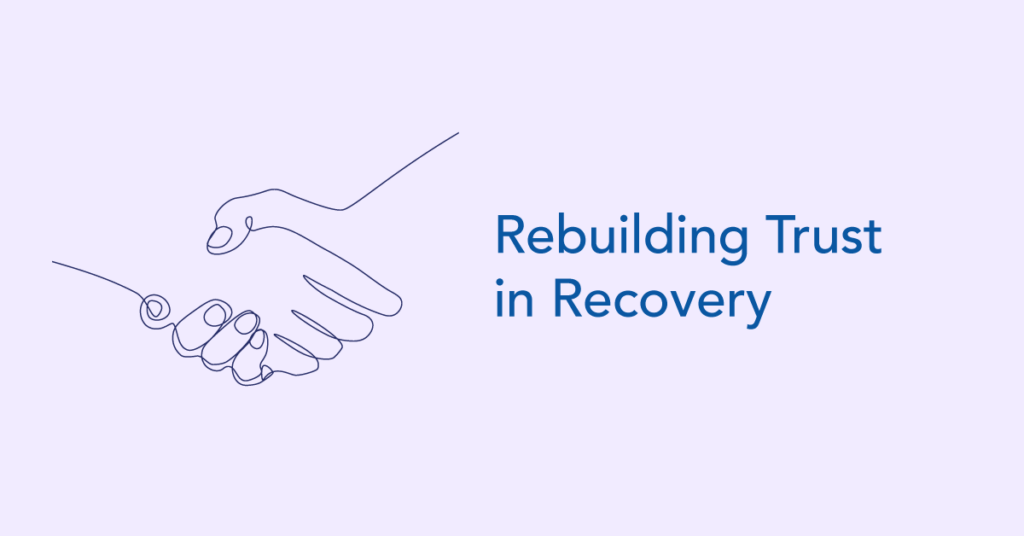Addiction can make people behave in uncharacteristic ways. They may become secretive, unreliable or withdrawn or even engage in dishonest behavior as a result of their addiction. If you’re a recovering addict, one of the main things on your mind may be how to gain back trust after such actions. Fortunately, rebuilding trust after addiction is possible, but it can take some time.
How Addiction Can Damage Relationships
Substance abuse affects people from all walks of life. According to the National Center for Drug Abuse Statistics, 50% of Americans aged 12 and older have used illicit drugs at least once in their lives, and 13.5% of them had used drugs in the month preceding the survey.
Despite substance abuse being such a common phenomenon, there’s a stigma surrounding it, and this stigma can prevent people from seeking help because they don’t want to admit they have a problem.
Substance abuse can affect relationships in several ways:
- Breaking the lines of communication. While in the grip of addiction, people may become withdrawn, defensive or even aggressive if someone tries to talk to them about their habit. This can cause loved ones to withdraw themselves, amplifying feelings of isolation.
- Financial stress. Addiction can place financial stress on families. Drugs and alcohol are expensive, and an addict may prioritize getting their next hit over paying important bills. In addition, addiction can impair a person’s ability to function at work, putting their income at risk.
- Neglecting personal relationships. Substance abuse can take over a person’s life, leading them to withdraw from their hobbies and friend groups. It’s only natural for friends and loved ones to feel slighted, especially if they’re unaware of the reason for the withdrawal.
- Mood swings and abuse. Some illicit substances can cause behavior changes, making people angry or aggressive while they’re under the influence. This is dangerous and upsetting for those who are caught in the crosshairs.
Loved ones of recovering addicts may find it difficult to balance their need to protect themselves from further hurt against their desire to help their friend or family member recover. An addiction specialist can help people develop strategies to support those they care about without putting themselves at risk.
Steps for Rebuilding Trust After Addiction
It takes time to regain someone’s trust after they’ve been hurt. Consider the following when attempting to rebuild trust in addiction recovery.
- Start with the basics. To rebuild trust after addiction, you’ll need to demonstrate that you’re serious. This means attending rehab or therapy appointments and doing everything you can to stay sober.
- Respect people’s boundaries. Accept that the people who care about you may take some time to believe you are sober and will stay that way. This isn’t an attack on you or a reflection on your character. Seeing someone you care about battling addiction is difficult, and they may need some time to heal themselves.
- Make amends where you can. Once you’ve been sober for a while, look for small ways you can make amends. Simple things like paying back debts, replacing stolen property or doing small favors for people are good ways to show you’re aware of the damage that was done and you’d like to repair things.
For people to trust you, you’ll first have to show that you’re trustworthy. This requires more than simply staying sober. Make an effort to be on time when you’re meeting people. Remember important dates, and complete tasks if you say you’ll do them for people. Every time you live up to a promise you’ve made, you’re taking a step closer to being seen as a trustworthy person.
Opening the Lines for Communication and Accountability
Talking about substance abuse isn’t easy, but it’s something that will need to happen for healing to begin. If you don’t feel like you can have such a difficult conversation with someone informally, consider inviting them to therapy. Many addiction rehab centers offer family or group therapy sessions. These provide a safe environment where a therapist acts as a mediator and guides the conversation, allowing healing to begin.
Taking accountability for your actions, acknowledging the way your addiction hurt those around you and explaining your plans for the future can help you rebuild relationships with those closest to you. Keep in mind that being accountable for your actions doesn’t mean you need to feel shame. Substance abuse and addiction can change people. You may have made some mistakes in the past, but that doesn’t make you a bad person today.
The Value of Patience and Consistency
Just as recovery from addiction is a long, difficult process, so is healing damaged relationships. If you’re patient and respectful and make an effort to stay sober, you have a chance of rebuilding your old relationships. Even if some of those relationships don’t go back to the way they were before, recovering from addiction gives you a new chance at life and an opportunity to make new friends and forge new relationships.
You have a chance to show those around you that the answer to “Can you trust an addict in recovery?” is indeed “Yes.” It’s possible to build a new life; it just takes time.
Get the Help You Need to Rebuild Trust
To have the best chance of recovery, you’ll need support from trained addiction specialists. The Mental Health Hotline is a free helpline open 24-7 to connect people with local resources. If you or someone close to you is experiencing a mental health crisis or needs someone to talk to about substance abuse, we can help you understand your options and take the first steps on the road to recovery.
For free, confidential help and support, contact the Mental Health Hotline today or browse our online resources.


